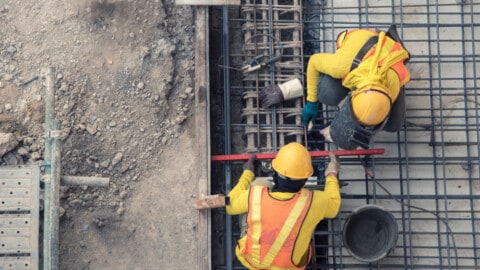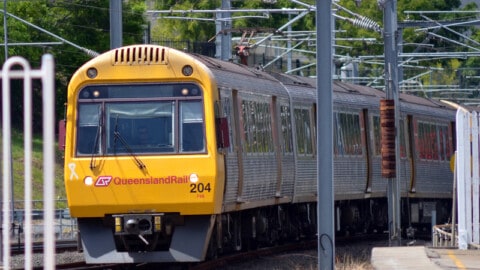The independent Sport Venue Review of the Brisbane 2032 Olympic and Paralympic games has been completed, with a number of venue changes flagged as a result.
The 60-day review of venue infrastructure was completed by an independent panel led by former Brisbane Lord Mayor Graham Quirk.
The final report was provided to the Minister for State Development and Infrastructure Grace Grace on 15 March.
Key changes that will be taken on board include:
- The new Brisbane Arena will proceed, but in a different location at the Roma St precinct
- Upgrades will be planned for the Queensland Sports and Athletics Centre (QSAC) and Suncorp Stadium, subject to due diligence and consultation with games partners
- Legacy transport opportunities to link QSAC, QEII hospital, and Griffith University with connected precincts in the city will be explored
- A proposed new stadium for Victoria Park has been ruled out
- The Gabba rebuild will not proceed
More than 900 submissions were received during the Review, while the panel held 130 meetings with stakeholders, assessed numerous studies, and conducted 28 site visits.
The findings have identified new opportunities to deliver value-for-money for Queenslanders, while supporting the government’s legacy vision. At its core, the government’s response prioritises community benefit while ensuring costs remain within the agreed funding envelope of $7.1 billion to be shared between the State and Federal governments.
The State Government will now explore upgrades to QSAC and Suncorp Stadium while continuing to deliver the new state-of-the-art Brisbane Arena, securing benefits for more than 30 sporting facilities across Queensland, and exploring opportunities for new transport connections in Brisbane as part of a revamped plan to enhance community legacy.
The State Government has said that the new Brisbane Arena is a much-needed piece of community infrastructure which will have multiple legacy uses for decades to come. It will feature within a connected precinct where accessibility and walkability will be a key feature to its position among the city’s cultural and entertainment centres.
Suncorp Stadium and QSAC are the two most highly used venues in Queensland, with QSAC hosting nearly 782,000 visits in 2022-23. More than 527,000 visits were community sporting groups and schools, with another 167,000 visits from training and aspiring athletes. This compares to community visits of less than 20,000 at the Gabba, and around 4,000 athlete visits. Any upgrades to QSAC will further broaden community access.
Investment at QSAC would also provide the opportunity to explore expanded transport links servicing not only the stadium but also Griffith University, the health precinct at QEII hospital, and the growing communities on the southside of Brisbane to provide additional legacy benefits.
The Moreton Bay community is also one of the winners, with their new Indoor Sports Centre being investigated for an expansion.
The Breakfast Creek Indoor Sports Precinct at Albion will not proceed, with the panel recommending an indoor sports centre be located in Zillmere or Boondall instead. The proposed upgrades to the Toowoomba Sports Ground will also not proceed, but opportunities to host other Games events in the region will be explored.
The State Government has said that it will move quickly to complete due diligence on venues in the coming months, followed by construction. Around half of these venues are outside of Brisbane, providing an economic and jobs boost during construction and beyond.
The review panel recommended a brand new multi-billion dollar stadium at Victoria Park. However, as the reviewers noted, significantly more work is required to understand the opportunity and before these preliminary findings can be relied upon.
The Queensland Government said that it does not believe it would be possible to deliver any new stadium at Victoria Park within the existing agreed funding, and the IOC has noted that a new stadium for the Olympic and Paralympic Games sits outside the “new norm” of using existing or already planned venues.
The State Government is therefore ruling out a stadium at Victoria Park, instead favouring investigating upgrades to QSAC and Suncorp.
The previously proposed re-build of the Gabba will not proceed, instead replaced with a more modest enhancement of the existing facility in consultation with the AFL, Cricket Australia, and other stakeholders.
Those sports will no longer be displaced from the Gabba, and East Brisbane State School will not need to vacate its current site by the end of 2025. However future works to the Gabba are expected to impact the school, and the government will work closely with the school community as those plans develop.
Any change of sports venue requires consultation with Games Delivery Partners, including the Federal Government, and final games approval from the Brisbane 2032 Organising Committee, the International Olympic Committee (IOC) and the International Paralympic Committee (IPC).
Delivery of the sports venue program will be the work of the Independent Delivery Authority when it is established mid-2024.
IOC Vice President, John Coates, said that Athletics Australia will be very pleased that with a QSAC upgrade, Queensland and Australian athletics will be left with a legacy venue for the development of the sport in Queensland.
“Sydney 2000 left a competition and warm-up track legacy for athletics, a legacy missing from the London, Rio, and Tokyo Games,” Mr Coates said.
“The IOC will make available its Games construction experts to advise in respect of the potential upgrades to QSAC, including specifically whether the full $1 billion of suggested upgrades are needed.”
Brisbane 2032 Organising Committee President, Andrew Liveris, said that the Olympic and Paralympic Games must fit the region, not the region fit the Games, and that the committee will use the venues and infrastructure made available to it.
“We acknowledge the Queensland Government’s actions in accepting the majority of the independent review’s recommendations and urge due diligence across venues and infrastructure to be completed quickly and in consultation with stakeholders,” Mr Liveris said.
“Time and cost estimates are of the essence and progress must move swiftly.
“Once decisions are finalised, we will work with the International Olympic Committee and International Paralympic Committee to refine our Venue Master Plan and Sport Program, in line with our Olympic Host Contract commitments.”
Queensland Premier, Steven Miles, said that this review was one of his very first acts as Premier of Queensland and was driven by what Queenslanders told him was important to them – bang for buck and a lasting legacy.
“No one wants to see money spent on facilities that are only needed for four weeks,” Premier Miles said.
“Instead, this new direction will deliver decades of benefit to local schools, community athletics programs and Olympic and Paralympic athletes in 2032 and beyond.
“My government will accept 90 per cent of the recommendations made, for the benefit of Queenslanders right around the state.
“One of their recommendations would have meant the demise of the Gabba, which is something we couldn’t accept for such a beloved venue.
“And while the concept of a new stadium at Victoria Park has merit, the uncertainty around final cost means it is unfortunately not an option.
“2032 is one of the greatest opportunities to put Brisbane and Queensland on the map and leave a legacy for generations to come.”















